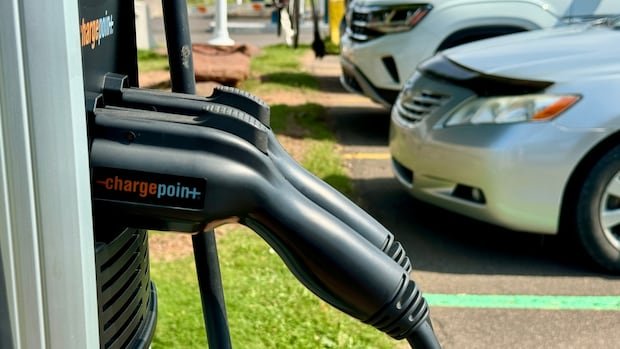Prime Minister Mark Carney has decided to postpone the implementation of a requirement for car manufacturers to meet specified minimum sales targets for electric vehicles. This delay is part of a set of actions revealed by the government on Friday to support industries most impacted by the tariffs imposed by U.S. President Donald Trump.
The enforcement of the electric vehicle mandate will be halted while the government conducts a 60-day assessment of the policy. Sales targets for 2026 models will not be mandatory. Sources disclosed to CBC News that the assessment will cover the entire mandate and outline future actions.
Addressing the media in Mississauga, Ont., Carney acknowledged the pressure on the automotive sector due to significant shifts in U.S. policies. He stated, “They’ve got enough on their plate right now. So we’re taking that off.” Carney highlighted that the government is utilizing the review to evaluate all climate-related measures.
This move signifies a deviation from the climate agenda of Carney’s predecessor. Former Prime Minister Justin Trudeau introduced the electric vehicle availability standard, also known as the zero-emission vehicle (ZEV) mandate. This regulation establishes progressive sales targets for light-duty vehicles, beginning at 20% in 2026 and aiming for 100% by 2035.
Automakers have been lobbying the Liberal government to repeal the mandate, arguing that it could jeopardize their businesses and endanger numerous jobs. Political opposition, particularly from the Conservatives, has criticized the mandate, claiming it would make gas-powered vehicles illegal and impose expensive electric vehicles on consumers.
Acknowledging the government’s decision, industry groups representing the automotive sector welcomed the delay of the EV mandate. They emphasized the need for immediate relief to safeguard Canadian jobs and industry competitiveness.
However, Greenpeace Canada criticized the delay, suggesting it aligns with policies contrary to environmental goals. The delay was viewed by some as a missed opportunity that could potentially undermine effective climate policies in the automotive sector.
The potential reintroduction of a consumer rebate program for electric vehicles is being considered by the federal government to enhance affordability and encourage adoption. This initiative follows the expiration of the U.S. electric vehicle tax credit and the suspension of Canada’s previous ZEV rebate due to funding constraints.
